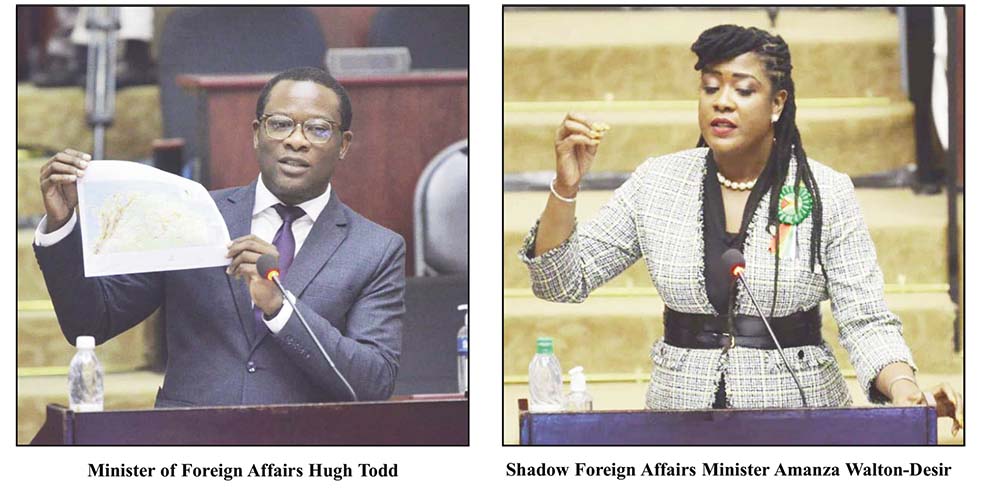Minister of Foreign Affairs Hugh Todd on Monday disclosed that 80% of migrants from Venezuela are either Guyanese or of Guyanese parentage.
He made this disclosure during the extraordinary sitting of the National Assembly where both Government and the Opposition unanimously voted in favour of the motion which reaffirmed recognition of the 1899 Arbitral Award settling the boundary between Guyana and Venezuela. It also rejected a controversial Venezuelan referendum on Essequibo which is set for December 3rd.
The subject minister’s comments came following a proposal by Shadow Foreign Affairs Minister, Amanza Walton-Desir, which suggested that the government should introduce legislation in the National Assembly that would regulate the influx of Venezuelan migrants in Guyana.
Desir who endorsed the motion which reaffirmed Guyana’s sovereignty over Essequibo contended that “there is an active incursion of persons from Venezuela as well as those returning from the Spanish speaking territory and are entitled to Guyanese citizenship”.
She noted that despite the human rights conventions and international laws which require the fair treatment of migrants where they are entitled to food, shelter, clothing and other amenities, this doesn’t prevent Guyana from promulgating legislation that sets out clearly how it deals with this issue.
According to the Shadow Foreign Affairs Minister this is paramount as Venezuelans are taught from an early age that Essequibo is part of their country and as a result Guyana cannot operate as if it is business as usual in wake of the threats the country faced constantly from the neighbouring state.
“We must consider that given the fact of this territorial claim, and given the fact of this belief that Essequibo belongs to them, whether we must not enshrine in our laws, provisions that speak to persons being and particularly migrants and people from our western neighbour, that we would say whether there is merit in considering laws that make it clear, that participation in inappropriate political activities, that amount to insurrection, treason or promoting cessation or annexation will be met firmly by prosecution, deportation and possibly a ban on residency,” Walton-Desir stated.
While noting that the Venezuelan migrants ought to be treated as guests and not threats, the Shadow Foreign Affairs Minister also said that “guests must also respect the rules and regulations of the country”.
Todd in response to this said “that the Venezuelan migrants are returning to Guyana because his government is well equipped to provide them with all of the amenities needed in a prosperous and stable environment”.
“We are in a good position to provide all the amenities for not only Guyanese but others abroad including those returning from Venezuela”, he informed.
“Mister Speaker allow me to inform the National Assembly that I have submitted based on her request (Walton-Desir) statistics from 2018-present on the entire migrant inflow from the Venezuela region”.
Multi-Agency
Todd also underscored that the government has a Multi-Agency Coordinating Committee to address the influx of Venezuelan migrants into Guyana, and the last meeting of March 8 which was publicized, was convened by the Foreign Affairs Ministry and attended by representatives of government agencies as well as international organizations.
He informed that the administration has had help from many Commonwealth delegations in relation to this issue.
Todd also reminded the National Assembly that the Ministry of Education established its Risk Management and Migrant Support Section (RM&MSS) in 2021.
The Unit is responsible for placing, monitoring, and supporting children in crisis-stricken communities, along with the integration of migrant children into the Guyanese society. The Unit collaborates with the United Nations Children’s Fund (UNICEF), United Nations Educational, Scientific and Cultural Organization (UNESCO), the United Nations High Commissioner for Refugees (UNHCR), the Inter-American Development Bank (IDB), and the Ministries of Human Services and Social Security, Health, and other stakeholders.
Walton-Desir in her delivery also said: “We must establish a robust, continuous education programme which will engender patriotism… The urgency of the situation demands that no effort must be spared to light the fire of patriotism in every man, woman and child”.
She posited that Venezuelans have grown up under the wrongful assumption that the Essequibo region belongs to them and not Guyana. Wary of more aggressive actions now, including the possibility of the annexing of Essequibo, Walton-Desir said Guyanese must be better educated on the longstanding controversy and all the efforts that have gone into getting a peaceful resolution.
During a recent meeting between President Irfaan Ali and Opposition Leader Aubrey Norton, it was agreed that a national education campaign is necessary.
In February this year the government estimate of migrants who had entered Guyana from Venezuela was around 40,000. This comprised nationals of the country, Guyanese Venezuelans who had lived there for several decades as well as nationals from other countries who had been living in Venezuela.
According to immigration records the figure was 20,000, but it was explained that the difference was accounted for by a distinction being made between those who had been born in Guyana but had lived in Venezuela for a long time and were not recorded as migrants when they returned with their families, and those who were not born here.
As of March 28, this year an inter-agency group led by the UNHCR and the International Organization for Migration estimated the number of Venezuelan refugees and migrants in the world at 7,239,953, of which 6,095,464 had taken refuge in Latin America and the Caribbean.






